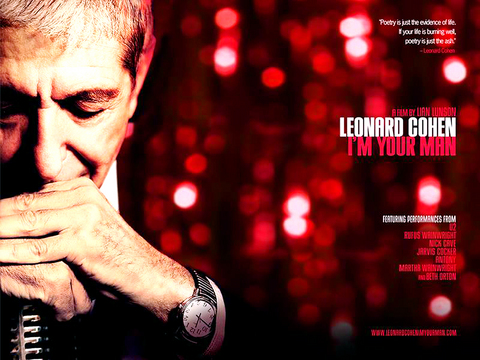When Leonard Cohen speaks, the elevated cadences of language are strewn with poetic images so precisely articulated in a rumbling bass-baritone voice that they all but erase the distinction between his song lyrics and personal conversation. Each word is carefully chosen and pronounced with oratorical flourish. Even when his sepulchral drone isn’t bending itself around a melody, its sound is musical.
Here is one sample of his conversational style, from Lian Lunson’s wonderful documentary portrait, Leonard Cohen: I’m Your Man. Reflecting on the inspiration for his song The Traitor, he muses that it is about “failing or betraying some mission you were mandated to fulfill and being unable to fulfill it and then coming to understand that the real mandate was not to fulfill it but to stand guiltless in the predicament in which you found yourself.”
If a strain of gallows humor didn’t underlie many of Cohen’s pronouncements, such observations might sound insufferably pretentious. But he continually undercuts his own solemnity. Here is he is on his own mystique as a silver-tongued Casanova: “My reputation as a ladies’ man was a joke. It caused me to laugh bitterly the 10,000 nights I spent alone.”

PHOTO COURTESY OF CROWN FILMS
Leonard Cohen: I’m Your Man combines pieces of an extended interview with this Canadian singer-songwriter, poet and author, now 71, with a tribute concert organized by Hal Willner at the Sydney Opera House in January 2005. Titled Came So Far for Beauty (after a Cohen song), the event featured performances of many of Cohen’s best-known songs by Nick Cave, Rufus Wainwright, Kate and Anna McGarrigle, Martha Wainwright and Antony (of Antony and the Johnsons), among others.
Some of the performers offer pungent personal comments. Cave recalls discovering Cohen’s Songs of Love and Hate album while living in a remote Australian town and suddenly “feeling like the coolest person in the world because it separated me from everyone and everything I detested.”
Bono and Edge from U2, who did not participate in the Sydney event, offer extravagant tributes and near the end of the film are shown accompanying Cohen in a New York club performance of Tower of Song. Edge likens him to “the man coming down from the mountaintop with tablets of stone having been up there talking to the angels.”
Bono observes, “As dark as he gets, you still sense that beauty is truth.”
Wainwright, who performs more songs than any other guest, sings Everybody Knows, Chelsea Hotel No. 2 (Cohen’s self-deprecating and indiscreet reminiscence of a sexual encounter with Janis Joplin), and Hallelujah (the Cohen song Wainwright and Jeff Buckley have made something of a downtown standard).
Two of the other more memorable performances come from Antony, who cries out If It Be Your Will in an eerie, shivering falsetto, and Teddy Thompson (son of Richard and Linda), who stamps the more obscure Cohen song Tonight Will Be Fine with the concert’s most intense vocal.
Reflecting on his life and work, Cohen recalls first encountering poetry in the Jewish liturgy at a synagogue. Some of his more recent recollections are of a purgative sojourn in a Zen monastery during the 1990’s on Mount Baldy, where he studied with a Japanese Zen master.
But a Zen-like austerity has always been present in his writing. A Zen spirit also informs his modest self-assessment of his life’s work.

In the March 9 edition of the Taipei Times a piece by Ninon Godefroy ran with the headine “The quiet, gentle rhythm of Taiwan.” It started with the line “Taiwan is a small, humble place. There is no Eiffel Tower, no pyramids — no singular attraction that draws the world’s attention.” I laughed out loud at that. This was out of no disrespect for the author or the piece, which made some interesting analogies and good points about how both Din Tai Fung’s and Taiwan Semiconductor Manufacturing Co’s (TSMC, 台積電) meticulous attention to detail and quality are not quite up to

April 21 to April 27 Hsieh Er’s (謝娥) political fortunes were rising fast after she got out of jail and joined the Chinese Nationalist Party (KMT) in December 1945. Not only did she hold key positions in various committees, she was elected the only woman on the Taipei City Council and headed to Nanjing in 1946 as the sole Taiwanese female representative to the National Constituent Assembly. With the support of first lady Soong May-ling (宋美齡), she started the Taipei Women’s Association and Taiwan Provincial Women’s Association, where she

It is one of the more remarkable facts of Taiwan history that it was never occupied or claimed by any of the numerous kingdoms of southern China — Han or otherwise — that lay just across the water from it. None of their brilliant ministers ever discovered that Taiwan was a “core interest” of the state whose annexation was “inevitable.” As Paul Kua notes in an excellent monograph laying out how the Portuguese gave Taiwan the name “Formosa,” the first Europeans to express an interest in occupying Taiwan were the Spanish. Tonio Andrade in his seminal work, How Taiwan Became Chinese,

Mongolian influencer Anudari Daarya looks effortlessly glamorous and carefree in her social media posts — but the classically trained pianist’s road to acceptance as a transgender artist has been anything but easy. She is one of a growing number of Mongolian LGBTQ youth challenging stereotypes and fighting for acceptance through media representation in the socially conservative country. LGBTQ Mongolians often hide their identities from their employers and colleagues for fear of discrimination, with a survey by the non-profit LGBT Centre Mongolia showing that only 20 percent of people felt comfortable coming out at work. Daarya, 25, said she has faced discrimination since she